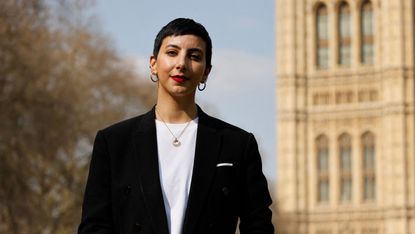Why the minimum marriage age is being raised in England and Wales
New law seeks to stop child brides being forced into wedlock

The minimum marriage age in England and Wales will be raised to 18 after a backbench bill cleared Parliament without opposition.
The bill, put forward last year by Conservative MP Pauline Latham, is set to receive Royal Assent and become law later this week.
People could previously get married at 16 or 17 if they had parental consent but ministers wanted to change the law in a bid to stop child brides being forced into wedlock, said the Daily Mail.
Subscribe to The Week
Escape your echo chamber. Get the facts behind the news, plus analysis from multiple perspectives.

Sign up for The Week's Free Newsletters
From our morning news briefing to a weekly Good News Newsletter, get the best of The Week delivered directly to your inbox.
From our morning news briefing to a weekly Good News Newsletter, get the best of The Week delivered directly to your inbox.
Seven-year prison sentence
The new law makes it an offence to marry a child, and applies to both registered marriages and unregistered ceremonial events. Adults who facilitate marriage for anyone under the age of 18 could face up to seven years in prison as well as a fine.
The offence would apply to a marriage “whether or not it is carried out in England and Wales”, meaning it would still be an offence to take children out of the country with the intention of carrying out a wedding.
Speaking to The Sun last year about the legislation, Dominic Raab, the Lord Chancellor and Secretary of State for Justice, said that: “forced child marriage ruins lives”.
He added that the bill would “keep vulnerable young people safe”, by “raising the legal age of marriage to 18, and closing gaps in the law which leave them at risk”.
Sign up for Today's Best Articles in your inbox
A free daily email with the biggest news stories of the day – and the best features from TheWeek.com
Ending child marriage
Writing on Twitter, campaigner Payzee Malika, who was coerced into marriage at the age of 16, celebrated the news. She said she was “struggling to put into words what this means”.
Malika’s sister, Banaz Mahmod, was murdered in 2006 because she ended a violent and abusive forced marriage. “This is for me, for Banaz, for any child impacted by child marriage”, she added.
Meanwhile, Latham said she was “thrilled” the bill was “on its way to becoming law,” reported the i news site.
The Tory MP said: “Thank you to all those who have supported the campaign to end child marriage once and for all in this country.”
North of the border
The new law does not affect marriages or civil partnerships that took place prior to this legislation and does not apply in Northern Ireland or Scotland, where people can still marry at 16.
A separate forced marriage law, introduced in 2014, made it a criminal offence – punishable by up to seven years in prison – to force someone of any age to marry against his or her will.
Create an account with the same email registered to your subscription to unlock access.
-
 'Republicans want to silence Israel's opponents'
'Republicans want to silence Israel's opponents'Instant Opinion Opinion, comment and editorials of the day
By Harold Maass, The Week US Published
-
 Poland, Germany nab alleged anti-Ukraine spies
Poland, Germany nab alleged anti-Ukraine spiesSpeed Read A man was arrested over a supposed Russian plot to kill Ukrainian President Zelenskyy
By Peter Weber, The Week US Published
-
 Today's political cartoons - April 19, 2024
Today's political cartoons - April 19, 2024Cartoons Friday's cartoons - priority delivery, USPS on fire, and more
By The Week US Published
-
 Incest accusation inspires second French #MeToo movement
Incest accusation inspires second French #MeToo movementfeature Waves of testimonies flood social media as member of Paris establishment faces abuse allegations
By Joe Evans Published
-
 Countries where divorce is illegal
Countries where divorce is illegalIn Depth England and Wales introduce less strict divorce laws, but ending an unhappy marriage is still not possible everywhere in the world
By The Week Staff Published
-
 British divorce laws: are they fair?
British divorce laws: are they fair?In Depth Supreme Court ruled woman who wants to divorce her husband must stay married
By The Week Staff Last updated
-
 Smacking children: should it be made illegal?
Smacking children: should it be made illegal?In Depth Controversial debate reignited over whether smacking constitutes reasonable punishment or child abuse
By The Week Staff Last updated